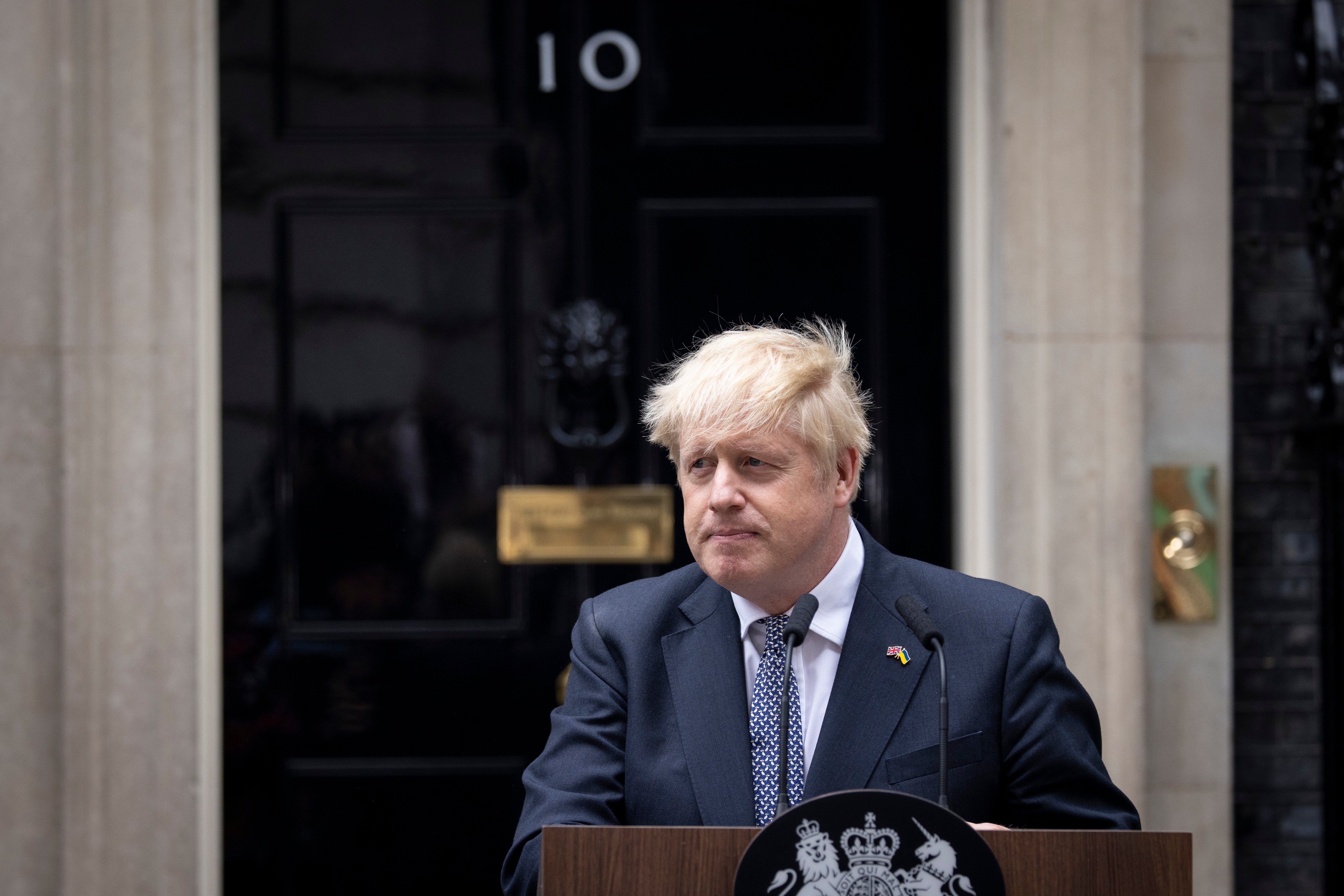Instability and an unedifying leadership race ahead as Boris Johnson finally stands down
Editorial: A new leader will redress the moral deficit, but it is difficult to see them revitalising a very tired and now traumatised government

The not-quite former prime minister Boris Johnson used to argue that changing prime minister at a time such as this would be a grave error. Of course, as ever, that was a guileful inversion of the truth, because it is precisely at times of crisis that a nation needs strong leadership, rather than dither, delay and sleaze.
The alternative, and the path not taken, would have been a clean-break exit for the prime minister, given that half his ministers had resigned and an acting prime minister, Dominic Raab, was ready to serve for a short time. With the shortest possible time wasted, the new prime minister could quickly “get on with the job” and set a new course for the government.
Instead, cakeist to the very end, Mr Johnson agreed to stand down as prime minister, but only on the condition he could carry on being prime minister while his successor is being selected. Perhaps Mr Johnson wishes to enjoy the perks of office, gild his legacy or dreams of a comeback.
In any case, as usual, Mr Johnson has lumbered his nation with the worst of all worlds now – a kind of Schrodinger’s prime minister, a shadow premier, a ghost in Downing Street heading a hybrid cabinet comprised of loyalists, quasi-loyalists who plead duty to serve, and a few battlefield promotions, with the nifty Nadhim Zahawi manoeuvring himself into the Treasury and a fine base for a leadership campaign. It will make for a continuing period of instability, with the distinct possibility that Mr Johnson will be even less restrained now he has nothing to lose.
To be fair, the prime minister cannot be blamed for the lack of an obvious successor. Rishi Sunak, as chancellor, was very much the creation of Mr Johnson and his then adviser Dominic Cummings, and was meant to be an obedient servant to No 10. It did not quite turn out that way, and, while well qualified in many respects, the secrecy surrounding Mr Sunak’s family tax arrangements damaged his prospects.
Ben Wallace is the current favourite, the solid defence secretary that no one could imagine covering Downing Street in garish wallpaper paid for by a party donor. He lacks Mr Johnson’s charisma, but more than makes up for it in integrity.
These two present “main runners” are currently part of a very crowded field. The sheer number of potential candidates, stretching to Steve Baker and Suella Braverman, risks making the contest both unwieldy and incoherent. Hustings and debates with a dozen or more contenders would allow none to make much of a case for themselves, and obscure rather than clarify the choices.
The last leadership election, a long ritual everyone knew would almost certainly be won by Mr Johnson, was a fairly pointless exercise during which Mr Johnson didn’t even bother with a manifesto. There were too many candidates, such as Matt Hancock and Esther McVey, who simply wanted to leave a “calling card” and lay a claim to a cabinet position on a slim show of support. There is no need for such indulgences now.
The 1922 Committee and the national party organisation would be well advised to follow the example of the Labour Party and raise the threshold for nominations far higher than the eight required in the 2019 contest. If the procedure is to be concertinaed, then putting a nomination list of about 10 per cent of the parliamentary party, say 35 MPs, would be a good start.
To keep up to speed with all the latest opinions and comment, sign up to our free weekly Voices Dispatches newsletter by clicking here
The party, and the country as a whole, does also have to face up to the reality that the next prime minister of the UK will be selected in the final round – not by the nation in a general election, or even by MPs – but by the 200,000 or so members of the Conservative Party.
They are, by definition, hardly a body representative of the nation as a whole, being richer, older, whiter and more southern than the electorate. Their obsessions are well known. How effective this system will be at selecting another vote winner is a matter of debate. It is also possible, and potentially problematic, that the candidate with the most support in the Commons is defeated by the activists’ favourite.
It is unlikely to be an edifying spectacle. After 12 years in power, the Conservatives appear exhausted and fresh out of ideas. They’ve drifted into sleaze and complacency, and, as the saying goes, they have no plan for the economy post-Brexit. A new leader will redress the moral deficit, but it is difficult to see them revitalising a very tired and now traumatised government.
Join our commenting forum
Join thought-provoking conversations, follow other Independent readers and see their replies
Comments
Bookmark popover
Removed from bookmarks